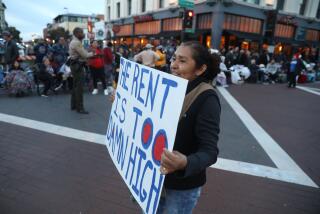D.C. politicians fail to face up to U.S. income inequality
- Share via
Both Republicans and Democrats say concern about the middle class is at the heart of the ongoing, vituperative debate over taxes, entitlements and fiscal discipline, but the political spat never seems to honestly address the gaping and growing class divide in the United States. As politicians in Washington slam one another over competing budget priorities, most avoid facing up to the disturbing question behind all the numbers: Is the American Dream temporarily stalled or permanently kaput?
Last Sunday, Parade magazine presented its annual survey, “What People Earn,” an exercise guaranteed to appall and infuriate readers as they compare their own salaries with the likes of Brad Pitt and LeBron James. The story is pretty much the same every year: Entertainers and athletes rake in tens of millions while secretaries and forest rangers scrape by on $35,000 to $40,000.
Sure, it seems a little insane that 19-year-old Justin Bieber makes $55 million – $6,261 an hour – while his high school music teacher probably struggles to pay the mortgage on his house, but the difference between what superstar entertainers earn and what undervalued educators are paid has always been ridiculous. The economics of Hollywood are abnormal. They may say something about our warped values, but they have never been representative of the entire economy – at least not until now.
It is more telling that Starbucks CEO Howard Schultz made close to $30 million last year while a typical twenty-something barrista at one of his coffee shops cannot find a better job, even with a college degree at the top of her resume, and so lives at home with Mom and Dad. CEOs and bankers and hedge fund managers are the new superstars of the economy. In many industries, the few men at the top make a hundred times the income of the guys and gals on the factory floor or in the office cubicles. And this is not because the men and women with the lower salaries fail to work hard enough.
Economics columnist Jon Talton recently did a rundown of the facts about today’s American economy. Among his findings:
• Worker productivity has increased nearly 23% since 2000, but hourly wages rose a pitiful 0.5% in that period.
• Taking a longer view back to 1973, productivity is up 80% between now and then, but pay is up only 11%.
• People at the bottom of the wage scale are earning less now than similar workers in 1979.
• Employees in the middle of the wage scale are getting 6% more than in 1979, but all that increase happened in the 1990s.
• High earners, meanwhile, are making 37% more than back in the 1970s, and the much-talked-about folks in the top 1% have enjoyed a 131% increase in earnings.
It is bad enough that we are going back to the income disparities of the 19thcentury’s Gilded Age, but Talton, like many other observers of the U.S. economy, notes that modern America is also becoming more stratified. We are moving toward the “Downton Abbey” society of the waning British Empire and away from the anyone-can-make-it-big America of the 1950s and ‘60s. Britain of 2013 has greater social mobility than the USA. In fact, it is now easier for the average German, Japanese or Dane to rise through the income ranks than it is for the average American. And if you are undereducated or mired in poverty, you are almost certainly stuck where you are – and the same goes for your children.
This is not the country we like to think we are and it is not the country our political leaders are willing to admit they have helped create. Thirty years of catering to Wall Street, big business and the U.S. Chamber of Commerce has not boosted the American economy the way it was meant to do. Yes, the financial industry and giant corporations are awash in wealth, but they are not hiring more workers, they are not paying better pay, they are not enhancing benefits, they are not sharing the wealth. On the contrary, the typical American is working much harder for worse compensation. He or she is paying a bigger share of the healthcare bill and has no pension plan waiting at the end of the line.
This is an all-American crisis bigger than the deficit or the war on terrorism, but no one seems ready to take it on.
More to Read
A cure for the common opinion
Get thought-provoking perspectives with our weekly newsletter.
You may occasionally receive promotional content from the Los Angeles Times.







